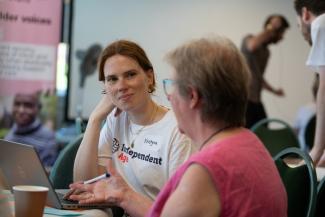Like any age group, older people are a diverse community with different needs, hopes and ambitions.
Some might look forward to a later life revolving around friends and family or mastering new skills, while others could find purpose continuing in a job they love or diving into volunteering roles and helping others. Sadly, this vision of a later life on your own terms isn’t the reality for many.
This report details a clear, shared experience of what it’s like to grow older in England.
What did we find?
We held a series of roadshows in cities across England, speaking to around 75 older people and more than 150 Independent Age campaign supporters. The problems they shared with us showed clearly how widespread the issues are that people in later life face: from money worries and problems accessing health and care support, to living in an area with no transport or being on the receiving end of ageism.
Spiralling costs
More than two million older people live in poverty in the UK. We heard from many that they just didn’t have the money to afford the essentials, causing stress and anxiety.
Transport
We also heard from people who felt that services such as transport in their area either didn’t exist or didn’t meet their needs. For many, this was because services were designed without consultation or input from older people, making life much more difficult.
Ageism
Overwhelmingly, the older people we spoke to felt they were treated a certain way, by society and decision-makers, because of their age instead of their needs as an individual.
Key statistics
Between 2010 and 2019 some 40% of pensioners spent at least one year living below the poverty line.
1 in 4 older private renters are in long-term poverty.
1 in 3 older people experience age-based discrimination or prejudice.
People aged 50 or over who are out of work are twice as likely as younger adults to be long-term unemployed.
1.6 million people aged 65+ have an unmet care need.
In 2021–22 more than two million people of State Pension age were living in poverty in the UK.
Why do we need a commissioner?
We heard from older people who have been shaped by significant barriers that have affected their life. Very often, these barriers are made worse by ageism and systems that aren’t built for the diverse community that exists in older age. The result of this for many in later life is a constant feeling of powerlessness, and that they don’t have a voice.
A Commissioner for Older People and Ageing would help to combat this, amplifying the voices of older people so that they can feel part of our society.
On top of this, a commissioner would be able to provide expertise and best practice to government and other institutions, so that services meet the needs of a diverse older community.
Finally, a commissioner would work as an independent champion, bringing together older people and professionals in government, the NHS, business and elsewhere to tackle the complex challenges older people experience.
What is Independent Age calling for?
We are calling on all political parties in the UK Parliament to include a manifesto commitment ahead of the next general election to establish a Commissioner for Older People and Ageing for England.

Want to know more?
Our full report is available to read and download. You'll hear directly from older people about the barriers stopping them from enjoying the later life they'd planned for, and how a Commissioner for Older People and Ageing can help.
How can you support us?
> Read more about why we need a Commissioner and how you can support our campaign
> Sign our support statement for a Commissioner in England
> Sign our support statement for a Commissioner in Scotland